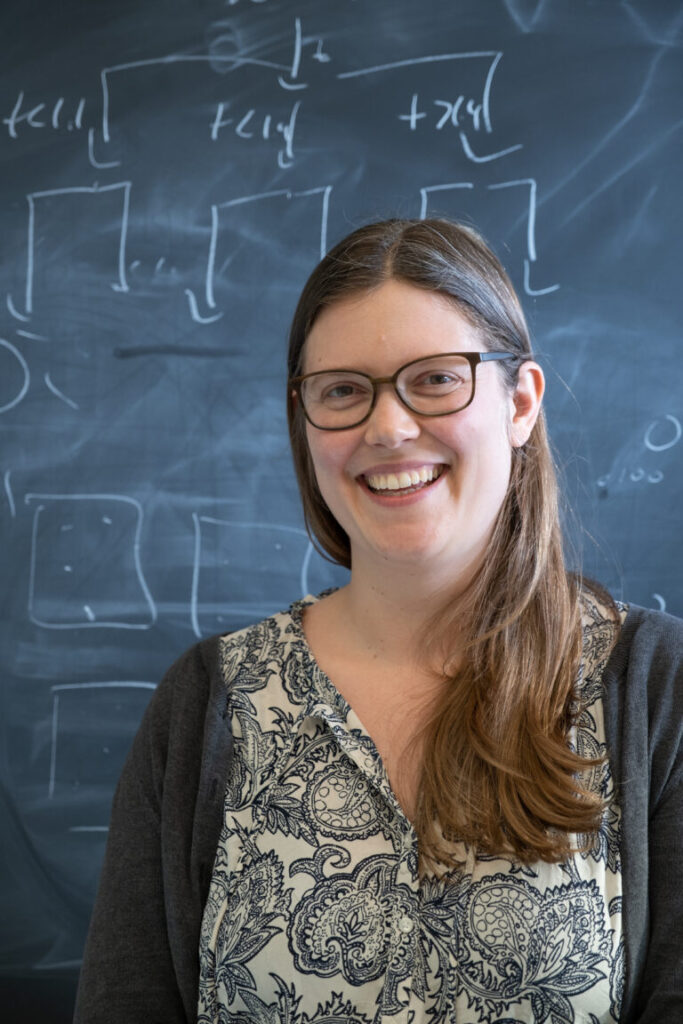Schoop Promoted to Associate Prof with Tenure
Leslie Schoop, a solid-state chemist whose research has garnered a number of high-profile awards over the past two years, has been promoted to associate professor with tenure in the Department of Chemistry.
The promotion takes effect on July 1, 2022. It was approved by the Princeton University Board of Trustees at their May meeting.
“I am just very happy to have gotten here, but it still needs time to sink in,” said Schoop, who joined the Department in September of 2017. “I’m grateful to be allowed to continue this job now as long as I like. And I’m always excited about forthcoming research.”

Associate Professor of Chemistry Leslie Schoop.
Department Chair Gregory Scholes, the William S. Tod Professor of Chemistry, lauded Schoop for her work at the interface of chemistry and physics, where she uses chemical principles to design new crystalline materials that have exotic physical properties.
“Challenges in the field of topological materials include finding new materials and using them to tune properties for ‘real’ applications. Thus, the field is shifting from crucial fundamental realizations to discovering practical systems for leveraging the new properties of these exotic materials,” said Scholes. “What is needed from the chemistry side of topological materials is an intuitive road map for new materials discovery. This road map would not only be enabling, but would provide a way to bring new materials chemists on board to this intimidating field.
“Leslie contends that the concept of orbital symmetry provides a better practical blueprint for topological materials discovery. This is precisely what she has achieved. Her ideas not only dramatically simplify the search for topological matter, they also provide unique opportunities for chemists to make an impact in the field.”
Schoop has received several prestigious awards in the past two years alone.
In 2020, she received a Packard Fellowship for Science and Engineering by the David and Lucile Packard Foundation, one of just 20 scientists nationwide to receive the prestigious, early-career award. Packard Fellowships are among the nation’s largest nongovernmental fellowships, designed to allow maximum flexibility in funding use.
In 2021, she was named an Alfred P. Sloan Research Fellow in Chemistry. This two-year fellowship is awarded annually to 128 early-career scientists and scholars of outstanding promise from the United States and Canada. Also in 2021, she received a Young Investigator Award from the Office of Naval Research for her work in new 2D materials.
Schoop was also awarded a Faculty Early Career Development (CAREER) grant from the National Science Foundation (NSF), Division of Materials Research, the NSF’s most prestigious award in support of early-career faculty. She was selected for her proposal on quantum materials in square-net based compounds.
Previously, she was named an EPiQS Materials Synthesis Investigator by the Gordon and Betty Moore Foundation in 2019, and a Beckman Young Investigator by the Beckman Foundation, also in 2019.
Schoop grew up in Germany near the borders of Belgium and the Netherlands. She received her Diploma in Chemistry from Johannes Gutenberg University, in Mainz, Germany. She completed her Ph.D. in Chemistry at Princeton under the advisement of Robert Cava, the Russell Wellman Moore Professor of Chemistry. Schoop conducted her postdoctoral work as a fellow at the Max Planck Institute for Solid State Research in Stuttgart, in the group of Professor Bettina Lotsch.
She has appointments as an associated faculty member of the Princeton Institute for the Science and Technology of Materials (PRISM), and was recently named vice executive director of the Princeton Center for Complex Materials (PCCM).
